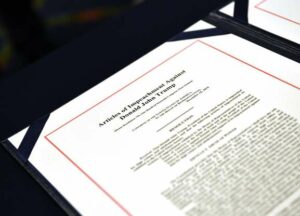Can we dispense with the tired — and patently ridiculous — notion that Donald John Trump’s impeachment is meant to “overturn” the results of the last election?
That goofy argument is part of the White House response to the articles of impeachment that the House of Representatives delivered to the Senate, which on Tuesday will commence the trial that will determine whether the current president of the United States keep his job.
I believe I shall remind everyone of a couple of historical facts.
The House Judiciary Committee voted for articles of impeachment against President Nixon in 1974. Nixon quit the presidency on Aug. 9 of that year. He had won re-election in 1972 in a smashing landslide: 49 states, 520 electoral votes, 60 percent of the ballots cast. That impeachment effort would have reversed the outcome of that election, too.
The House impeached President Clinton in 1998. He stood trial in 1999 and was acquitted. Clinton won re-election in 1996 with a handsome margin: 379 electoral votes and a healthy plurality of actual votes. And, yes, that impeachment was intended to overturn an election result, too.
Presidential impeachment by definition are intended to do the very thing that the White House is now accusing the House of doing. I know that House members who voted to impeach the president stand behind high-minded rhetoric about “defending the Constitution.” I believe that is the case here.
However, this act also carries with it a necessary political component, which is that it seeks to correct a ballot-box mistake. Let’s not be coy about this point as well: Trump did not win in anything approaching a landslide. He pulled in nearly 3 million fewer votes than his opponent in 2016 and won because of an adroit end-of-campaign tactic that saw him win three key Rust Belt states that put him over the top in the Electoral College count.
Impeachment is meant to overturn an election? Well, as we used to say in high school: No sh**, Sherlock!
